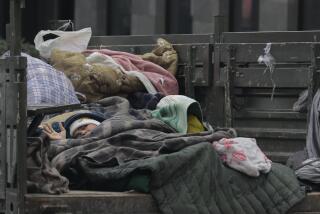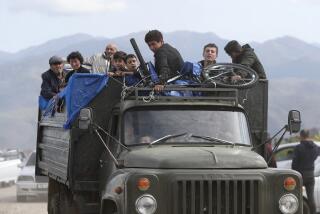Fervor Dies Down in Bishkek
- Share via
BISHKEK, Kyrgyzstan — As salesclerk Lubov Maksimenko helped reopen the only department store in this Central Asian capital that escaped looting after the ouster of President Askar A. Akayev, she mused that no one seemed totally thrilled or terribly angered by his fall.
For pro-democracy opponents of the long-ruling leader, “the looting ruined everything.” But those who thought he was a good president were disappointed that he had fled to Russia rather than fight the protests that drove him from power, she said.
“In the army, a soldier who runs away is punished,” said Maksimenko’s co-worker, Naila Tairova, 25. “Here we see the general running away.”
Bishkek’s residents are waiting warily to see how political developments sort out in this predominantly Muslim country of 5 million people near Afghanistan, China and several oil-producing nations of the Caspian Sea region. Most hope for an improvement in their lives. But they are unsure that the new leadership, drawn from onetime allies of Akayev, will do any better.
Akayev, who had been president since 1990, when Kyrgyzstan was still part of the Soviet Union, was driven from the country by protests over alleged fraud in recent parliamentary elections. In Moscow on Sunday, he indicated that he would submit his resignation from office today.
The protests culminated in the takeover March 24 of the main government building in Bishkek, followed that night by looting that targeted stores owned by the president’s family or his close associates.
Olga Starykova, 22, a student, criticized Akayev for failing to raise living standards during his 15 years in power, but she called the looting a form of terrorism.
“We cannot say now for sure whether we are glad,” she said. “We think things will be OK. But now we are a little bit afraid. We are afraid for the future of Kyrgyzstan, because it changed so fast and in this way -- with the help of terrorism and such unpleasant things. That’s why everybody’s worried.”
Presidential elections have been set for June 26. Many in Bishkek already have a favorite between the two men now seen as the top contenders. One is acting President Kurmanbek Bakiyev, from the country’s south, which led the opposition to Akayev. The other is Felix Kulov, a former interior minister from the north, who was released from prison at the demand of protesters on the day of Akayev’s ouster. Both have said they plan to run.
Hours after Kulov’s release, Bakiyev put him in charge of the country’s security forces to end the looting that broke out after Akayev fled. Kulov organized police and groups of citizen volunteers to suppress attempted looting. He resigned his powerful but ad hoc security post Wednesday, able to claim credit for having restored order.
Before his imprisonment in 2001 on what were widely seen as politically motivated charges of corruption and abuse of power, Kulov had held a series of prominent posts, including vice president, a governorship, mayor of Bishkek and head of the opposition Ar-Namys Party.
Ordinary citizens and police accepted Kulov’s transformation from prisoner to security chief because “he was not a hooligan,” Starykova said. “He was in prison for political reasons.”
Kyrgyzstan is divided into north and south by high mountain ranges, with only a single road linking the two regions. There are also deep historical and cultural divisions, with the north more deeply influenced by Russian culture. Some observers expect these differences to play an important role in the presidential balloting.
A successful transition to a freer system could result in a beachhead for democracy and greater U.S. influence in Central Asia. Akayev himself was seen as a democratic figure during his early years in power, but critics say that over the years he drifted toward increasingly authoritarian methods.
“I can’t say our president was bad or good,” said Elnura Abishaova, 21, another clerk in the store. Akayev’s biggest mistake, she said, was to allow his family to get rich: “All the good buildings belonged to our president’s son and our president’s wife.”
Kymbat Almazbekova, 40, a homemaker with four children, is uncertain what the future holds. “During the last government, I had little hope for life getting better,” she said. “People always resented those who were shamelessly getting rich.” But so far, she complained, the new authorities “are mainly thinking about their own problems.”
*
Holley was recently on assignment in Bishkek.
More to Read
Sign up for Essential California
The most important California stories and recommendations in your inbox every morning.
You may occasionally receive promotional content from the Los Angeles Times.










